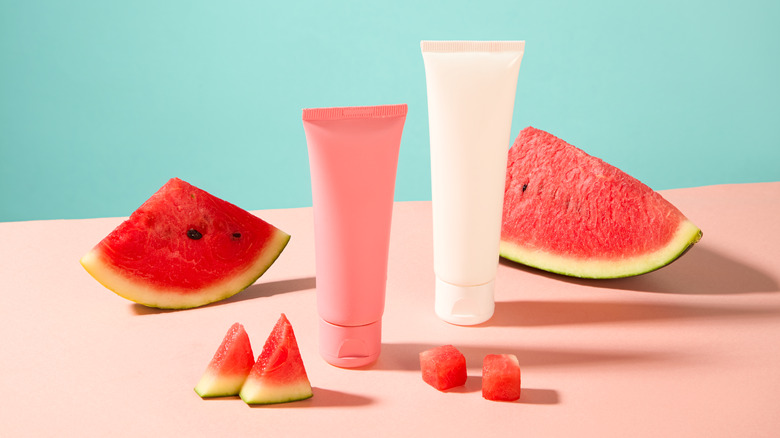The Popular Fruit That Can Actually Make You Look Younger
With the demands of 9-5 jobs, household chores, socializing, and the added element of harsh summers and long winters, your skin, more often than not, takes quite the beating. In fact, one of the surprising ways your body changes as you get older actually has to do with your skin — we're talking wrinkles, fine lines, age spots, sun damage, and less production of collagen. So, what if we told you there is one very simple thing you can do to slow down aging — more specifically, a nutritious and delicious fruit that you can add to your diet?
We're referring to watermelons, of course. These summer-friendly, thirst-quenching fruits can be enjoyed whole as a fruit, added to smoothies, or tossed in salads for a refreshing twist. Native to Africa and with a rich history spanning thousands of years, they are grown in almost every continent of the world.
Watermelons are mainly known for how hydrating they are because 92% of the fruit is made up of water. This same hydrating property of watermelon also helps fight aging. Hydration is important for overall health and being physically healthy (or unhealthy) can show up on your skin. "If you are dehydrated, the outermost layer [stratum corneum] won't contain enough water and skin won't spring back if you push on it. If you rehydrate, your skin bounces back," explained Cleveland Clinic dermatologist Dr. Alok Vij (Web MD). This is not all watermelon does to make you look youthful, however.
How eating watermelon might help you look younger
Watermelons contain the antioxidants vitamin C, glutathione, lycopene, and beta-carotene. These nutrients can help with the health of your skin.
Vitamin C is essential for collagen production. Collagen is what gives your skin elasticity and strength, while also boosting skin cell turnover.
Glutathione combats aging by improving cell health, protecting against oxidative stress that leads to wrinkles, and fighting age spots and dark circles under your eyes.
Lycopene is probably one of the most talked about antioxidants in watermelon, mainly because it's what gives watermelon its characteristic red hue. It is also one of the properties of this fruit that's associated with combating cancer and diabetes. When it comes to aging, lycopene does the all-important job of protecting your skin from sun damage. It does this by reducing the redness of the skin and preventing the effects of photoaging. You may have already heard that you're making yourself look older if you skip sunscreen. While sunscreen and a protective hat are still musts when outdoors, consuming watermelons can give you an added layer of protection.
Your body can use beta-carotene to produce vitamin A. Vitamin A's synthetic derivatives, called "retinoids," are what we use in the form of anti-aging products on our skin. They help repair your skin, prevent dry skin and flaking, and combat cell damage and skin aging.
Other skin-friendly nutrients in watermelon include vitamin E, vitamin B6, and L-citrulline. Vitamin E is associated with preventing moisture loss, maintaining soft skin, and protecting against cell damage, while vitamin B6 is important for combating acne. L-citrulline is converted to L-arginine and protects your skin from the harsh realities of weather and environmental pollution.
Does topical application of watermelon help?
You may have noticed that watermelon is a popular ingredient in face washes and creams. Topical application of this fruit also has skin-friendly benefits that help you look younger. While you might be able to derive some of these benefits from face creams and face washes, experts also recommend using the fruit itself to combat the effects of aging.
According to Dr. Howard Murad — a dermatologist, pharmacist, and clinical professor — watermelon juice applied to your face can act as a natural exfoliant. "Watermelon is rich in the alpha-hydroxy acids citric acid and malic acid, which are natural exfoliants. Regular exfoliation rids the skin of dead cells, brightening your complexion, and boosting collagen production," shared the skincare expert.
Additionally, the cooling properties of this fruit can soothe heat rashes — all you have to do is apply a previously refrigerated rind of the fruit to your skin, shared Dr. Murad. Watermelon rind application has also been recommended for skin conditions like rosacea and sunburn.
As you may already know, topical application of synthetic vitamin A, or retinoids, is associated with improving the appearance of fine lines and wrinkles, although it is unclear if watermelon applied directly to the skin can accomplish this. There are skincare products that contain the fruit that claim to do so, however. Perhaps, this is a question for your dermatologist. It's definitely one of the less bizarre anti-aging treatments you might want to try.



